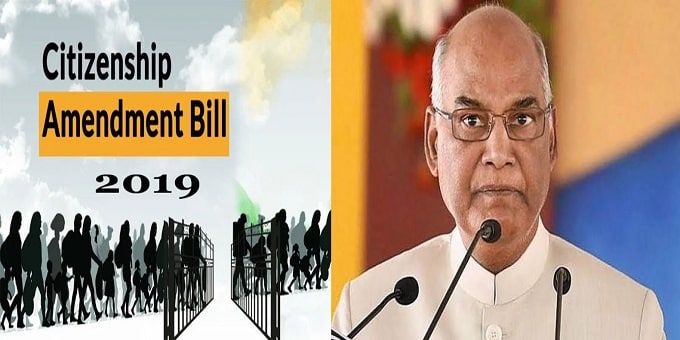On December 12, 2019 the President of India Shri Ram Nath Kovind approved the Citizenship (Amendment) Bill, 2019. After his assent, the bill has changed into Citizenship (Amendment) Act, 2019. This act amended Citizenship Act, 1955 by granting citizenship to undocumented non-Muslims migrants from Bangladesh, Pakistan and Afghanistan who came to India on or before December 31, 2014. The act will also relax the requirement of residence in India for citizenship by naturalisation from 11 years to 5 years for these migrants. Citizenship Amendment Act 2019:
Citizenship Amendment Act 2019:
- Act purpose: The act would enable acquisition of Indian citizenship by persons who were forced to seek shelter in India due to fear of on grounds of religion. The act will provide ease in obtaining citizenship.
- Act excluded regions: The act will not be applicable to tribal areas of Assam, Meghalaya, Mizoram and Tripura as included in the sixth schedule of the Constitution and States of Arunachal Pradesh, Mizoram and Nagaland that are protected by the Inner Line Permit (ILP).
- Citizens of other states should possess ILP to visit the three States (Arunachal Pradesh, Mizoram, Nagaland, and Manipur) as per the Bengal Eastern Frontier Regulation, 1873.
- Religional exemption: Illegal migrants other than the 6 communities which are Hindu, Buddhist, Christian, Parsi, Jain and Sikh from the three neighbouring countries (Bangladesh, Pakistan and Afghanistan) will not be able to take up jobs, purchase land or settle down in these areas.
- Citizenship: The Act will enable a person belonging to the above mentioned six religious communities who do not have proof of birth of his parents in support of his being Indian origin, to apply for citizenship by completing six years of residency period in India.
- Citizenship acquirement: The Act specifies that citizenship may be acquired in India through five methods – by birth in India, by descent, through registration, by naturalisation (extended residence in India), and by incorporation of territory into India.
- Illegal migrants: Illegal migrants in the country will be prisoned or deported under the Foreigners Act, 1946 and the Passport (Entry into India) Act, 1920.In 2015 and 2016, the government exempted specified groups of illegal migrants from provisions of these two acts.
Bill background:
During the 2014 elections, the Bharatiya Janata Party(BJP) had promised to grant citizenship to Hindu refugees from Bangladesh and Pakistan as part of its election manifesto.Thus, the Citizenship (Amendment) Bill, 2016 was introduced.
The Citizenship (Amendment) Bill, 2016:
- Bill introduced in 2016: The citizenship amendment Bill 2016 was introduced in Lok Sabha on July 2016 to amend the Citizenship Act, 1955.
- There was political opposition and protests in the northeast India over this bill as the people’s chief concern was that the demography of Northeast India would change with the influx of migrants from Bangladesh. The Bill lapsed with the dissolution of the 16th Lok Sabha.
- Bill reintroduced: In the 2019 election campaign, the BJP’s manifesto reiterated its commitment to bring in the Bill. The National Register of Citizens (NRC) was updated in Assam state in 2019, leaving out 1.9 million residents, a majority of whom were Hindus, without citizenship. This matter brought urgency to bring in the Bill.
- Later, the Citizenship (Amendment) Bill, 2019 was introduced in Lok Sabha in December 2019.
Possible questions that could be asked:
- Which act was amended by introducing the Citizenship (Amendment) Act, 2019?
Ans: Citizenship Act, 1955.
- Migrants from which all countries will be granted citizenship?
Ans: Bangladesh, Pakistan and Afghanistan.
- Citizenship will be granted to those non mulim migrants of Bangladesh, Pakistan and Afghanistan who settled on or before?
Ans: December 31, 2014.
- Requirement of residence in India for citizenship by naturalisation has been reduced from 11 years to?
Ans: 5 years.
- The tribal areas of which all states are excluded under the act?
Ans: Assam, Meghalaya, Mizoram and Tripura.
- Illegal migrants apart from how many mentioned communities will be exempted to take up jobs, purchase land or settle down in the exempted tribal areas?
Ans: 6 ( Hindu, Buddhist, Christian, Parsi, Jain and Sikh).




